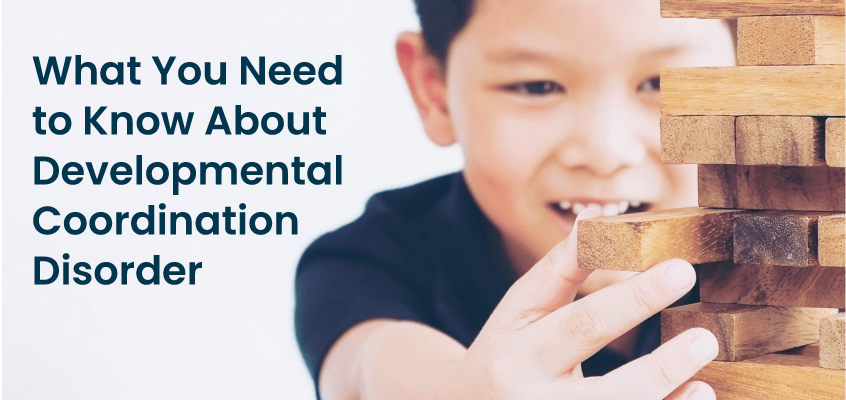Introduction
Children with DCD or developmental coordination disorder have poor motor skills and cannot perform tasks such as getting dressed, riding a bicycle or tying shoes without help. While it occurs commonly in children, DCD is not a manageable condition to diagnose and treat. According to research, developmental coordination disorder can broadly impact a child’s life quality. Treatment for this condition is possible by working with a paediatrician and an occupational therapist.[1]
What is Developmental Coordination Disorder or DCD?
Children develop the potential to stand, sit up, walk and talk at specific ages. However, those late to hit these milestones may have developmental issues, and developmental coordination disorder is one possibility.
Also called dyspraxia, DCD affects a child’s physical coordination, leading them to perform poorly in daily activities as per their age. Children with DCD generally cannot move their fingers, hands and other body parts in a coordinated manner and must put in much effort and time to learn new skills. Catching a ball or tying shoelaces become frustratingly arduous procedures. Children with DCD can also not play games, dance or write well. According to research, DCD is 3 to 4 times more common in boys than girls.[2]
What causes Developmental Coordination Disorder or DCD?
Despite extensive research, there is still no consensus on the causes of DCD. But studies show that certain risk factors, such as low birth weight and premature birth, can increase the odds of a child developing this condition. According to research, postnatal exposure to steroids can also develop developmental coordination disorder.[3]
Studies also indicate that children with obesity might be at a greater risk of developing developmental coordination disorders. Mothers who take illicit drugs or drink alcohol during pregnancy have greater chances of giving birth to babies with a high risk of developing DCD. The condition can also be hereditary, although it is still unclear which genes might be at fault.
Diagnosis of Developmental Coordination Disorder or DCD
It is challenging to diagnose DCD, considering its symptoms can easily be confused with those of other disorders. Generally, a paediatrician, physiotherapist and occupational therapist interpret DCD.[4]
First, they conduct a norm-referenced assessment of the child’s motor skills. Next, they assess the child using the motor A.B.C. procedure. This procedure involves tests of:
-
Fine motor skills: This assesses the child’s potential to use small muscles for coordinated movements like drawing or placing tiny pegs in holes.
-
Gross motor skills: This assesses the child’s ability to use large muscles for coordinated movements like balancing and jumping.
-
Experts compare the child’s performance during these tests and the scores of normal children of the same age group.
-
Sometimes, psychologists might also assess the mental ability of the child.
-
A study of the child’s medical history helps clarify if there are any birth-related issues and any delays in reaching developmental milestones.
Symptoms of Developmental Coordination Disorder or DCD
The symptoms of DCD become evident right after birth. Newborn babies might have trouble learning to suck and swallow milk. They might be slow to learn how to sit, crawl, walk, talk and roll over as they grow.[3] Significant signs of developmental coordination disorder include:
-
Difficulty running downstairs
-
Unsteady gait
-
Running into people
-
Dropping objects
-
Frequent tripping
-
Difficulty in performing activities such as colouring, using scissors and writing
-
Difficulty in dressing, tying shoes and various other self-grooming activities
-
Clumsy or awkward movements
-
Difficulty learning new skills
-
The problem in using learned skills in various ways
-
Becoming exhausted quickly, leading to poor posture
-
Difficulty eating without making a mess.
Children with DCD may become self-conscious and refrain from socialising or socialising, or playing a sport, which might lead to weight gain and compromised muscle tone. Therefore, DCD-affected children must be encouraged to participate in appropriate physical and social activities.
Treatment for Developmental Coordination Disorder or DCD
Developmental coordination disorder has no definite cure, but different therapies help manage children’s problems. Treatment for DCD involves a four-step approach that includes a long-term education programme, occupational therapy, physical therapy and social skills training.
-
Physical therapy helps to develop coordination and communication skills and helps balance the brain and the body.
-
Different sports like bicycling and swimming can build motor skills.
-
Daily exercise trains the body and brain to work in coordination and reduces the chances of obesity.
-
Occupational therapy helps the child master regular activities.
Doctors might offer DCD treatment per the child’s condition and generally involves several healthcare experts working together. Although the physical coordination of a child with DCD remains below average for life, proper treatment will ease the condition’s symptoms as the child gets older.
How does DCD affect daily life?
Developmental coordination disorder might look different for each child based on their age. DCD can affect the daily life of a preschool-aged child by making it difficult for them to:
-
Use a spoon, fork or straw
-
Climb or use playground rides and equipment
-
Work on crafts, colour or draw
-
Get dressed and undressed
-
Maintain proper balance.
It can affect school-aged children by making them incapable of:
-
Writing clearly and neatly
-
Riding a bicycle
-
Swimming
-
Playing team sports.
Teenagers with DCD can face challenges in the:
-
Completing regular activities such as preparing meals
-
Learning to drive
-
Conducting tests and written assignments
-
Doing different physical activities.
Conclusion
Delays in a development challenge a child’s overall well-being. Likewise, it can be challenging for their family members. Nevertheless, developmental coordination disorder is manageable with the proper treatment therapies. It is advisable to consult an expert or healthcare professional for appropriate guidance if you feel your child has DCD.
For expert care in the comfort of your home, contact United We Care, an online mental health platform connecting you with psychologists and life coaches to help improve your child’s life. Click here to talk to a child psychologist today!











